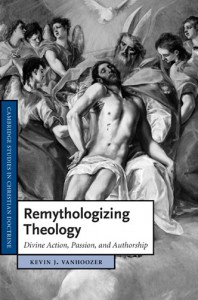 Vanhoozer says “My wager is that this brief detour into the dispute over the meaning of Dostoevsky’s authorship will yield theological dividends for understanding God’s communicative relation to the world.” (p. 311) Indeed it does, in two ways.
Vanhoozer says “My wager is that this brief detour into the dispute over the meaning of Dostoevsky’s authorship will yield theological dividends for understanding God’s communicative relation to the world.” (p. 311) Indeed it does, in two ways.
First, it sharpens the meaning of divine authorship in a way that clarifies the God-world relationship. “God authors/elects creatures to be dialogical agents in covenantal relation through whom his Word sounds (and resounds).” (p. 331) God relates to the world like an author, but especially he relates to it like a very good (Dostevsky good!) author whose characters have serious, thick, created integrity.
But secondly, it leads the theological interpreter into Scripture in a way that is guaranteed to be more fruitful than monlogic models, because more appropriate to the way God has spoken. Vanhoozer pays close attention not only to what God has said (as all good evangelicals know they should), but consummately to the way God has said it. That attention pays off on page after page of Remythologizing. Some quotations:
The Bible is both a unified (one mythos) and many-voiced (i.e. polyphonic) discourse whose form is theologically significant. (p. 26)
The Bible schematizes God’s being-in-act through mythos, through the variety of canonical forms that together comprise the theo-drama, the form of forms.” (p. 477)
Each biblical form that contributes to the mythos is itself a thing God has done, a word God has made. (p. 477)
Biblical reasoning… involves the conceptual elaboration of the form and content of the Bible, itself a means of divine communicative action. This involves not merely thinking about but with and through the various voices and forms that constitute the Bible. (p. 477) (A foonote from Vanhoozer here: “Perhaps it would be more accurate to speak of the ‘form of the content’ or the ‘content of the form’ inasmuch as form and content belong together in discourse… so discourse is ‘informed content’ or ‘contented form.’)
Biblical reasoning involves more than simply abstracting and ordering statements about God into a cognitive-propositional system… God speaks through the prophetic and apostolic discourse of the Bible as a playwright speaks through the various characters in a play. God speaks his mind dialogically, communicating through different voice-ideas from multiple points of view in a variety of ways (i.e. canonical schemata). All the voices, in their specific registers, are necessary in order to achieve the total communicative effect: the understanding and obedience of faith. (pp. 478-9)
This massive attention to the manner of Scripture also accounts for why most of chapter 1 (pages 35-57) of Remythologizing is a series of biblical passages explored one after the other, with more exegetical insight than is strictly necessary for a work of high-level theological abstraction. Vanhoozer is not only our chief theorist of the Theological Interpretation of the Bible, but also a gifted practitioner who increasingly makes room to carry out the task.
One could describe Remythologizing as a “higher evangelicalism,” in that evangelicals are only supposed to attend to what God says, but Vanhoozer attends to how God says it. He goes deeper into the word of God, listening to the voice of God. Apparently he goes beyond sola scriptura to sola vox scriptura. Not only are the words and sentences inerrant, but perhaps even the genres are inerrant! At any rate, “Biblical reasoners do well to appreciate the subtlety and depth of the divine rhetoric.” (p. 193)
God accommodates his speech to our capacities, and part of God’s accommodation is the extent to which he engages in indirect communication in Scripture. This makes his speech somewhat tricky, or more like “the authorship that Kierkegaard labeled ‘indirect communication’ than … Hegel’s ‘system’ of abstract theoretical truth.” (p. 191) As an interpreter of God’s speech in the Bible, Vanhoozer alerts us to the fact that “the watchword for indirect communication is ‘show, don’t tell.” (p. 191). Throughout Remythologizing, Vanhoozer is practicing and modeling a style of theology that attends closely to how God says what he says in Scripture.
When evangelical theological reading of scripture falls flat, it is usually because because we have settled for information, but not transformation. “Theology only compounds the problem when it gives the impression that knowing God is a matter of neat theoretical packaging (i.e. systems of belief).” (p. 191) By contrast, “Remythologizing theology approaches each of the various forms of biblical discourse as an important ingredient in the divine communicative strategy.” (p. 192)
In other words, not only are we attending to a voice from heaven, but we are attending to this particular voice, speaking these particular words, in a complex event of communication in which the form and the content are both important.